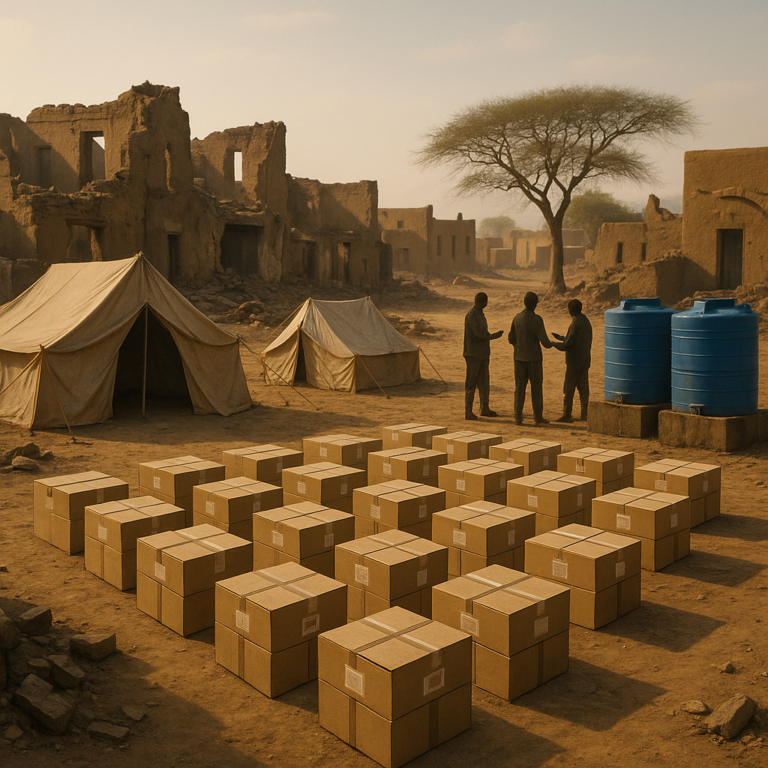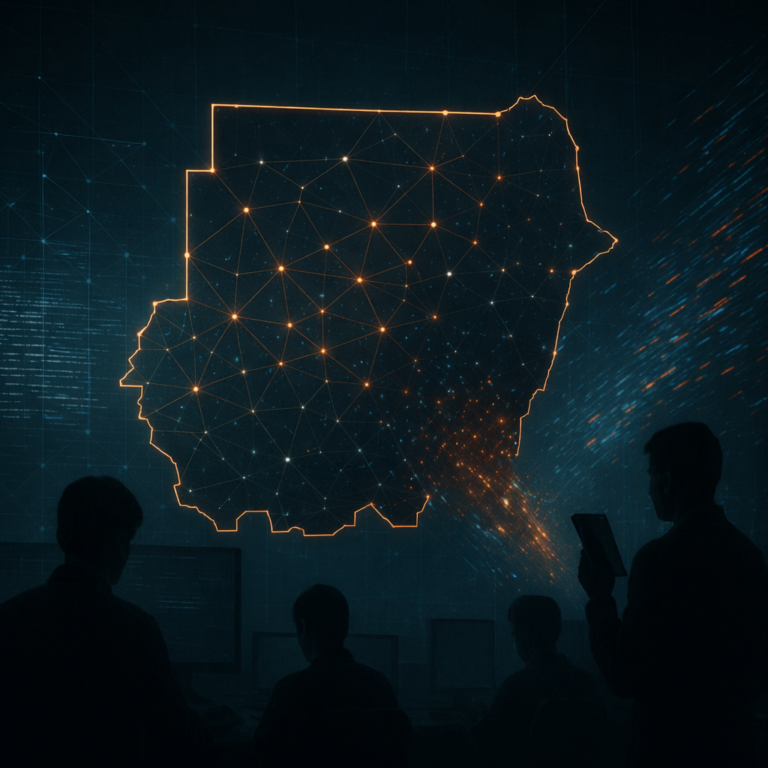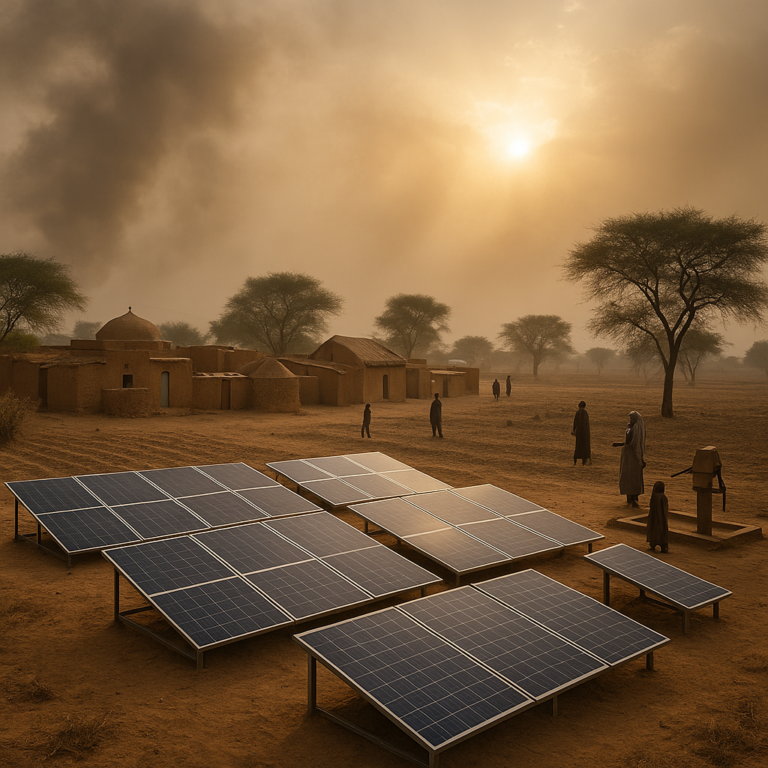المؤلفة: مرافئ الباهي
Date of Writing: September 26, 2024
Affiliation: Published as part of the Sudan Democracy Fellowship 2024.
Disclaimer: The views expressed in this publication are those of the author(s) and do not necessarily reflect the policy or official stance of AMEL.
AMEL Fellowship Description: زمالة السودان gلديمقراطية هي برنامج عبر الإنترنت مخصص لتمكين الأصوات الناشئة للتأثير على المناقشات العالمية حول الديمقراطية والسلام والتنمية في السودان. من خلال سلسلة من ورش العمل التفاعلية والتدريبات ومشاريع البحث القائمة على الأدلة، يكتسب الزملاء الزميلات مهارات حاسمة في التحليل وصياغة السياسات والمناصرة.
Involves The perception of conflict by several theorists is viewed on three levels that require attention: the top level, the mediator, and the grassroots. The perception of conflict by several theorists is viewed on three levels that require attention: top policy, middle range, and grassroots work.
Leidrach argues that the key to effective and strategic peacebuilding lies in coordinating relations between these levels both horizontally and vertically. He coined this approach as "multi-track diplomacy." While second-track diplomacy refers to various forms of informal and non-governmental interactions, involving gathering scholars, senior journalists, opinion leaders, former government officials, or other politically influential individuals from the conflicting parties to work together with the aim of exploring different possibilities for resolving the crisis, there is limited research on grassroots-level peacebuilding efforts. However, some theorists consider focusing on local actors as a "third track."
This study suggests focusing on third-track diplomacy, which emphasizes grassroots groups, as more than 9 mediation initiatives involving international and regional actors have been proposed since the outbreak of the war on April 15, 2023, between the Armed Forces and the Rapid Support Forces. Despite the variety of these initiatives, none have achieved their goal of ending the war as of the writing of this paper in September 2024. The majority of current international interventions are superficial, aiming only to temporarily contain the conflict, driven by economic and geopolitical competition, which affects the actual support for peacebuilding. This study assumes that the political and social complexities of Sudan's current crisis require choosing pathways that suit the Sudanese reality, through which the dilemma of stalled civil action and participation in efforts to stop the war and build peace can be addressed. Therefore, it emphasizes the necessity of working at the grassroots level.
The analysis of current and past international community movements and their approach to peacebuilding processes in Sudan has been traditionally focused on securing a ceasefire to end violence, solidifying it through power-sharing between armed actors, setting a timeline for institutional reforms (security, economic, and constitutional), and then engaging civil actors. However, this formula repeatedly fails. It often rewards violence and undermines civilian politics. Instead, diplomats and decision-makers need to adopt a radically different approach by prioritizing grassroots groups. Particularly, the strategies of grassroots groups are more influential and adaptable to security risks, and they play a crucial role in reducing conflict at the community level. The persistence and complexity of the current war stem from recruitment processes and the expansion of the war internally through mechanisms for gaining popular and tribal support. Therefore, there is a need to coordinate with grassroots initiatives that have the ability to influence and benefit from developing their programs in a "peace from the bottom up" process. Sudan's uniqueness requires coordination and communication with traditional institutions such as local forces, tribal administrations, and Sufi orders. Tribes and their administrations still hold significant influence and authority in many areas of Sudan, with the role of civilian administrations diminishing. Additionally, emerging factors, such as the phenomenon of "Hakamats" (female mediators), reflect an alternative experience of women's participation in peacebuilding processes.
The process of supporting grassroots initiatives is fraught with challenges related to the complexities of the social and political structure, as well as the culture of civil society work in the region, amidst international efforts that include (elite opposition, limited access to areas with risks or heightened conflict, lack of political progress, continued conflicting objectives, politicization of peacebuilding initiatives, limited resources and lack of peacebuilding infrastructure, funding, shortage of trained members, scarcity of reliance on research and information, and difficulty in finding safe spaces for meetings and coordination). On the other hand, the grassroots base also needs to be able to translate citizens' knowledge into changes in government policy direction and national behavior. This highlights the importance of networking with these grassroots groups and supporting them through various means and methods.
There is a need for more feasible policies to engage stakeholders and expand the civil society base in order to adopt a more effective approach. Especially after the war stops, state institutions will be biased, as the level of suffering endured by Sudanese citizens due to this war will lead the vast majority of them to support a military state, with a social contract based on a key element: "security and protection of the citizen and the nation." As a result, the opportunity to introduce an agenda related to "development, justice, freedom, and democracy" as key components in the political structure, discourse, and social contract of the post-war state is narrowed. Therefore, adopting this agenda requires coordination with social and political forces.
It is clear from the above that the active international powers are following a diplomatic approach that does not align with Sudan's specific context and the complexities of its crisis. Therefore, the study focused on what theorists have called the "third track" by activating the roles of grassroots groups and addressing their shortcomings in organized and effective participation. Furthermore, there is a need for more research and detailed analysis to develop effective policies that ensure the effectiveness of coordination in the peace process, built on a "bottom-up" approach, in line with the complexities and challenges of civil society work. This will help explore the factors and opportunities for meaningful youth and civil society participation in peacebuilding and restoring the path to democratic transition. The international community needs to change its approach by moving beyond temporary agreements that target only the major military and political forces and by including clear investment plans for building permanent peace structures. This can be achieved through gathering and analyzing social data to understand public opinion and using this information to guide international policies and humanitarian efforts in a manner that aligns with the needs of the Sudanese people.
Mediation Negotiations from Diverging Perspectives
"...It is logical that they should be held accountable for all this destruction, devastation, and death, not rewarded with an agreement that returns them to power... Any peace agreement with these individuals will lead the country to an inferno."
"Agreement and peace, in the end, are undoubtedly good and acceptable matters, but these are not humans to agree with. Those who stand with them are equally guilty."
"If they are gathered in camps, disarmed, and tried for the many crimes they have committed against the people, then peace can be discussed. Otherwise, any attempt at top-down peace will lead to a major crisis in the society that is currently boiling. The owners of the homes that were looted, whose families were killed and tortured, will not remain silent, and the situation will become uncontrollable, making it difficult for any government to manage."
"We will not accept the presence of Hemeti, Abdel Rahim, and the militias in the scene after everything they have done. We will also not accept the presence of Silk, Al-Daqir, and the Umma Party group. These are provocative matters, and if anyone tries to impose them on the Sudanese people, the next war will be all-encompassing."
بالطبع! الترجمة هي: **"Report: 'How Sudanese People View the Geneva Negotiations,' Al-Ahdath Newspaper, July 31, 2024."**
References:
- Herbert C. Kelman, “Transforming the Relationship Between Former Enemies: A Social-Psychological Approach,” in After the Peace: Resistance and Reconciliation, ed. Robert L. Rothstein (Boulder, CO: Lynne Rienner
- Publishers, 1999).
- Ryan, “Transforming Violent Intercommunal Conflict”; Rothstein, “In Fear of Peace”; Dan Shanit, “Letter to the Palestinian Health Organizations,” e-mail to IPCRI-News—Views electronic mailing list from pngonet,
- June 16, 2005.
- Johan Galtung, “The Specific Contribution of Peace Research to the Study of Violence: Typologies,” in Violence
- and its Causes, ed. United Nations Educational Scientific Cultural Organization (Paris, France: UNESCO, 1981), 83–96.
- Camilla Orjuela,“Civil Society in Civil War: Peace Work and Identity Politics in Sri Lanka,” PhD
- dissertation, Göteborg University, 2004, P9.
- John W. McDonald, “The Need for Multi-Track Diplomacy,” in Second Track/Citizens’ Diplomacy, eds. Jon Davies and Edward (Edy) Kaufman Lanham, MD: Rowman and Littlefield Publishers, 2002).
- Lederach, “Justpeace—The Challenge of the 21st Century,” in People Building Peace, ed. European Centre for Conflict Prevention (The Hague, The Netherlands: European Centre for Conflict Prevention), 27–36.
- John Davies and Edward Kaufman, Second Track/Citizens’ Diplomacy, 3–4.
- Wendy Lambourne, “Justice and Reconciliation: Postconflict Peace-Building in Cambodia and Rwanda,” in Reconciliation, Justice and Coexistence, ed. Mohammed Abu-Nimer (Lanham, MD: Lexington Books, 2001), 311–338.
- انظر:
- “Meeting of the Extended Mechanism on the Sudan Crisis,” African Union, 2/5/2023, accessed on 15/7/2024, at https://tinyurl.com/mrywnp3v
- ” انعقاد الاجتماع الثاني لوزراء خارجية مسار دول جوار السودان بنيويورك”، الهيئة العامة للاستعلامات المصرية، 20 / 9/ 2023 ، شوهد في 30 / 7/ 2024 ، في: https://tinyurl.com/mw23vnpp
- الشرق الأوسط‘ تحصل على ‘اتفاق المنامة‘ بين الكباشي ودقلو”، الشرق الاوسط، 19 / 2/ 2024 ، شوهد في 30 / 7/ 2024 ، في: https://tinyurl.com/bdzza22h
- أنباء عن وساطة ليبية تركية في أزمة السودان”، الجزيرة نت، 5/ 3/ 2024 ، شوهد في 30 / 7/ 2024 ، في: https://tinyurl.com/3wjxafcy
- لتفاصيل اكثر انظر:
- “Communiqué of the 1st Meeting of the IGAD Quartet Group of Countries for the Resolution of the Situation in the Republic of Sudan,” IGAD, 10/7/2023, accessed on 11/3/2024, at: https://tinyurl.com/4m6sr2em
- “Final Communiqué of the 14th Ordinary Session of the IGAD Assembly of Heads of State and Government,” IGAD, 12/6/2023, accessed on 18/6/2024, at https://tinyurl.com/muxds6h3
- “Communiqué of the 41st Extraordinary IGAD Assembly of Heads of State and Government,” IGAD, 9/12/2023, accessed on 11/5/2024, at: https://tinyurl.com/29ps5w8y
- “الخارجية السودانية: رفض حكومة السودان لرئاسة كينيا للجنة إيقاد الرباعية”، وكالة السودان للانباء، 7/ 9/ 2023 ، شوهد في 15 / 6/ 2024 ، في: https://tinyurl.com/4wudtaw8
- ” اختتام مؤتمر بمصر بشأن الأزمة السودانية وقوى ترفض التوقيع على بيانه الختامي”، الجزيرة،7/7/2024،شوهد في 27/7/2024،في https://2u.pw/cuLnPlCs
- “Meeting of the Extended Mechanism on the Sudan Crisis,” African Union, 2/5/2023, accessed on 15/7/2024, at https://tinyurl.com/mrywnp3v
- ” UN chief and officials condemn fighting between Sudanese forces”, UN News, 15/4/2023, accessed on 15/4/2024,at https://news.un.org/en/story/2023/04/1135702
- As Desperate Sudanese Flee Their Embattled Nation, Security Council Urges Warring Parties to Respect Ceasefire, Reboot Negotiations, Immediately End Fighting, Meetings Coverage and Press Releases UN Nations, 25/4/2023, accessed on 15/4/2024, at https://press.un.org/en/2023/sc15265.doc.htm
- Jeddah Declaration of Commitment to Protect the Civilians of Sudan, An official website of the United States Government, 11/5/2023, accessed on 15/4/2024, at https://www.state.gov/jeddah-declaration-of-commitment-to-protect-the-civilians-of-sudan/
- إعلان جدة الصادر عن القوات المسلحة السودانية وقو ات الدعم السريع”، وزارة الخارجية السعودية، 12 / 5/ 2023 ، شوهد في 20 / 3/ 2024 ، في: https://2u.pw/rbNP6Bs
- اتفاقية وقف إطلاق النار قصير الأمد والترتيبات الإنسانية”، وكالة الانباء السعودية ، 21 / 5/ 2023 ، شوهد في 20 / 3/ 2024 ، في https://www.spa.gov.sa/w1905904
- “Sudan: Vote on UNITAMS Mandate Renewal”, Security Council Report, 2/6/2023, accessed on 11/5/2024, at https://2u.pw/8CAD2Ieq
- Sudan declares UN envoy Volker Perthes ‘persona non grata, AL JAZEERA, 9/6/2023, , accessed on 11/5/2024, at https://2u.pw/GMt4Bv6c
- UN envoy to Sudan steps down after being declared unwelcome by government, AL JAZEERA,13 /9/2023, , accessed on 11/5/2024, at https://2u.pw/uBXMFiBm
- Lederach, Preparing for Peace; Laura Nader, Harmony, Ideology, Justice, and Control in Sapotic Mountain Village (Stanford, CA: Stanford University Press, 1990);
- See: S.W. Cook, “Experimenting on Social Issues: The Case of SchoolDesegregation,” American Psychologist 40/4 (1985): 452–460; Thomas F. Pettigrew, “Intergroup Contact Theory,” Annual Review of Psychology 49 (1998):
- 65–85; Hewstone and Brown, “Contact is not Enough.”
- أعلنت الهيئة الشعبية لنصرة القوات المسلحة السودانية (وهو الاسم الرسمي للمستنفرين) في 30/10/2023 ، عن تخريج عدد (415) ألف مستنفر من ولايات السودان المختلفة. وأكد أنور الصديق عبد رب النبي؛ المشرف العام للهيئة الشعبية لنصرة القوات المسلحة بالسودان إن الذين تم تخريجهم وجاهزون الآن بلغ عددهم (415) ألف مستنفر، بالاضافة ال مئة الف تحت التدريب بالمعسكرات في ولايات السودان المختلفة
- هل تقلب مشاركة حركات دارفور بالحرب الموازين لصالح الجيش السوداني؟”، الجزيرة نت، 27 / 3/ 2024 ، شوهد في 16/6/2024، في: https://tinyurl.com/5bz7nn3t
- مبادرة التسامح بين بني هلبة والسلامات.. عزيمة الشباب تنتصر للسلام، راديو دبنقا، كمبالا، تقرير: عبد المنعم مادبو 22مايو2024
- اللمصدر السابق، من مداخلة س الم النو- ناشط مدني.
- “هل تقلب مشاركة حركات دارفور بالحرب الموازين لصالح الجيش السوداني؟”، الجزيرة نت، 27 / 3/ 2024 ، شوهد في 16/6/2024، في: https://tinyurl.com/5bz7nn3t
- “‘كتيبة البراء بن مالك تحقيق ل ‘العربي‘ يكشف قصتها ودورها بأحداث السودان”، تلفزيون العربي، 17 / 7/ 2023 ، شوهد في 16 / 6/ 2024 ، في: https://tinyurl.com/37wj65ke
- “كيف ينظر السودانيون لمفاوضات جنيف؟”، تقرير، امير عبد الماجد، الاحداث،31/7/ 2024، ص3
- مخاطبة رئيس مجلس السيادة القائد العام للقوات المسلحة ضباط وضباط صف وجنود منطقة وادي سيدنا العسكرية، يوتيوب، صفحة مجلس السيادة السوداني، 2/7/2024، شوهد في 8 يوليو 2024، في: https://youtu.be/Mj-S90w28Rk?si=XUh1vyNmOMnY8DcQ
- كلمة البرهان في نفرة محليات الدامر- عطبرة- بربر، صفحة مجلس السيادة السوداني فيس بوك، 11/7/2024، شوهد في 13/7/2024، في https://fb.watch/tzzCk–PBQ/




